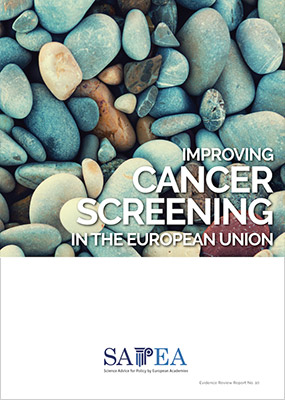14 Mar Improving cancer screening in the European Union
Organised cancer screening programmes save lives. The earlier a cancer is diagnosed, the greater the chances of treating it successfully and straightforwardly.
Improving existing screening.
Many European countries already have screening programmes for cervical, breast and colorectal cancer. The evidence indicates some ways in which these existing screening programmes can be improved:
●Cervical cancer. Conventional smear tests (cytology) should be replaced with testing for HPV, the virus that causes cervical cancer, as a first line of screening. HPV testing is needed less often than cytology and can be easily done at home, which improves access. By combining these improvements with widespread HPV vaccination, especially among teenagers, we may eventually be able to eradicate cervical cancer in Europe.
●Colorectal cancer. Screening should be improved by optimising how frequently people are screened, depending on age, sex, and results of previous tests.
●Breast cancer. Screening should be extended to women in their mid-40s, and MRI scans should be considered for women with dense breast tissue, for whom mammography is less effective.
New screening programmes.
●Lung cancer. There is a strong scientific basis for introducing lung screening for current and ex-smokers using the latest technologies, such as low-dose CT scanning. This should be combined with ongoing programmes to help people give up smoking.
●Prostate cancer. There is strong scientific evidence for the benefits of organised prostate cancer screening using blood tests, particularly combined with follow-up MRI scans for men who have a positive blood test result.
For other cancers, the evidence does not yet support population-wide screening. New technologies, including multi-cancer blood tests, are not yet ready for routine use — but research is moving fast and we should be prepared to introduce new methods, especially in high-risk populations.
How to implement screening programmes.
Clinical trials are valuable, but they cannot tell us exactly what will happen when a nationwide screening programme is implemented in the real world. So any new programme should be rolled out gradually, using local small-scale pilots.
Once a programme is running, it needs to be continually monitored and adjusted to maintain quality. Standards, guidelines and screening criteria should be continually updated to take advantage of emerging evidence and new technologies, and the EU has a role in coordinating this. This would also allow countries to share experience and data, and to optimise the use of resources.
The EU also has a role in supporting public awareness campaigns, and in creating large-scale biobanks to improve future research.
Meanwhile, offering opportunistic screening tests outside of organised programmes — and to people with no symptoms — leads to poor quality and unequal access. This should be avoided.




Sorry, the comment form is closed at this time.